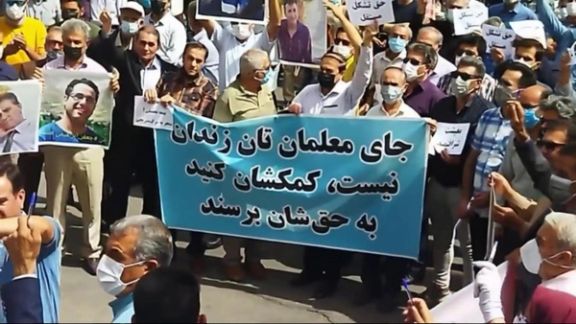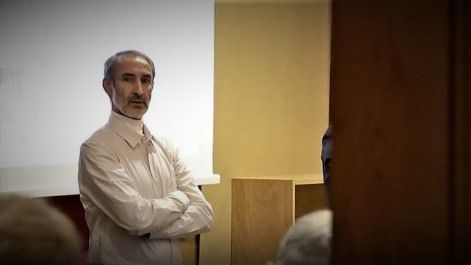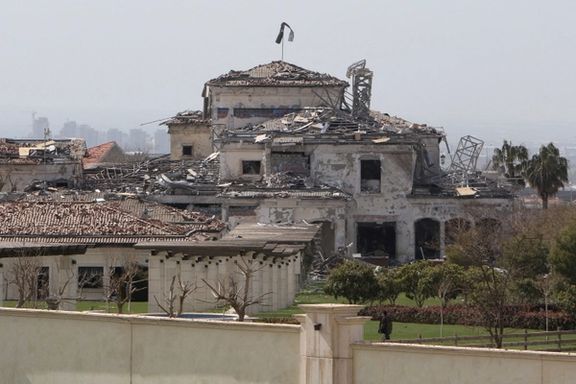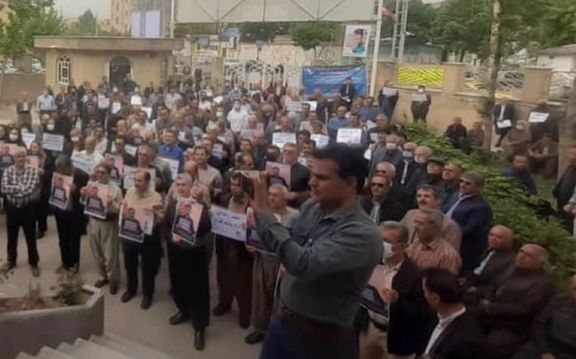At Least 40 People Arrested Following Teachers' Nationwide Protests

At least 40 teachers and teachers' union activists have been arrested in 10 cities across Iran during and after a round of nationwide protests on Sunday.

At least 40 teachers and teachers' union activists have been arrested in 10 cities across Iran during and after a round of nationwide protests on Sunday.
Iranian teachers staged demonstrations across the country on May1, the international Labor Day, organized by the Coordination Council of Iranian Teachers’ Trade Associations.
The number of teachers detained during the protest rallies has reportedly been estimated at between 20 and 70, while some have been released so far. A few union activists had been arrested on the eve of Sunday demonstrations.
According to the council, security officers raided the homes of numerous teachers and activists on Monday and used violence during their arrests.
Reports say at least 30 other the teachers have also been summoned and threatened by the Intelligence Ministry in Tehran or its offices in other cities. At least 30 people have been detained by the Intelligence Ministry officers and taken to undisclosed locations.
Teachers say they will continue their protests until authorities meet their demands including the implementation of decade-old legislation that would bring the salaries and pensions of 750,000 teachers in line with other civil servants as well as the freedom of their colleagues who have been imprisoned for their trade union activities.
People from different walks of life, including teachers, nurses, firefighters, and even staff members of the judiciary department and prison guards, have held regular protest rallies or strikes to demand higher salaries.

Iranian officials were silent on Monday regarding reports that the European Union wants to send its envoy back to Tehran to jump start the stalled nuclear talks.
Iran on Monday was in a total confusion, as it was not clear if Ramadan ended or not, and if there was a public holiday. The foreign ministry did not hold its weekly press briefing.
Western diplomats told the Wall Street Journal on Sunday that the EU is offering to send its top negotiator Enrique Mora to Tehran again to persuade Tehran to show flexibility.
Mora, the senior EU official chairing the Vienna process, has told Iranian negotiators he is ready to return to Tehran to open a pathway through the deadlock, diplomats told the Wall Street Journal. Mora failed to convince Tehran to return to the talks during his March 27 visit.
Talks in Vienna to restore the 2015 nuclear deal, Joint Comprehensive Plan of Action (JCPOA), have been in limbo since mid-March when Iran insisted that its Revolutionary Guard (IRGC) be removed from the US list of terrorist organizations. The US has not agreed to the demnd.
Reuters reported on Monday that the West has almost given up on the process and is contemplating what to do next.
"They are not yanking the IV out of the patient's arm ... but I sense little expectation that there is a positive way forward," one source, who like others quoted spoke on condition of anonymity because of the issue's sensitiviy, told Reuters.
Western diplomats told the Wall Street Journal that they want to put the onus back on Tehran, making it clear the talks could fail unless Tehran took a step to end the stalemate. Mora, they said, will try to persuade Tehran to leave the issue of IRGC's delisting to a future point and sign off on the deal now. Tehran has so far not responded to the proposition, the report said.
In a phone talk with Iranian Foreign Minister Hossein Amir-Abdollahian's on April 20, the EU foreign policy Chief, Josep Borrell expressed frustration over the pause in the talks and called for fresh contacts between Enrique Mora and Iran’s lead negotiator Ali Bagheri-Kani.
Iran insists that it will not give up on its demand for the removal of the IRGC from the US list of Foreign Terrorist Organizations (FTO), calling it a 'red line' it will not cross at any cost
The Biden administration is adamant that it will only negotiate the delisting of the IRGC if Tehran also agrees to discuss other issues which are important for Washington, presumably Iran's aggressive regional policies and support for militant groups, which are also outside the JCPOA purview.
Despite the deadlock in the talks that appears to have much to do with the IRGC regional activities and pledge to take revenge on American officials for ordering the targeted killing of Ghasem Soleimani, officials in Tehran have shown no signs of softening their rhetoric in the past few weeks
Soleimani, commander of the Qods (Quds) Force, the IRGC's extraterritorial arm, was killed in a drone attack in Baghdad in January 2020 on Trump's orders.
The pause in talks has given ample opportunity for JCPOA critics in both Tehran and Washington. The Republicans have highlighted the prospect that lifting US ‘maximum pressure’ sanctions on Iran in return for Tehran accepting JCPOA limits on its nuclear program would see Tehran repatriate billions of dollars currently frozen by creditors wary of punitive US action.
US Democratic Senator Bob Menendez (NJ) reiterated Sunday that no nuclear deal with Ian was better than a bad deal. “It’s 2022. It's not 2014. Some of the original deal sunsets are even closer… to ending a pathway where Iran could ultimately achieve its goal,” a reference to the belief that Tehran is bent on producing nuclear weapons.

Iran’s Foreign Ministry has summoned the Swedish ambassador to Tehran over the case of Hamid Nouri, a former Iranian judicial official on trial for his role in prison purges in 1988.
The ministry called in Ambassador Mattias Lentz on Sunday evening to convey the Islamic Republic’s protest over the continued imprisonment of the former Iranian official, describing charges against him as “baseless and fabricated”.
The Islamic Republic said the trial is a “political show” and urged Sweden to release the Iranian national.
The ministry called his detention “totally illegal” and driven by “false allegations made by the Mujahedin-e-Khalq Organization (MEK) terrorist organization and the hostile smear campaign against the Islamic Republic.”
In the 89th session of Hamid Nouri’s trial on Friday, plaintiffs' lawyers said Nouri played "an active role" in the execution of thousands of political prisoners in Iranian prisons and requested the court hand out the maximum sentence of life imprisonment.
Nouri, allegedly a former deputy prosecutor at Gohardasht Prison near Tehran at the time of the killings, has been charged with “war crimes, crimes against humanity, torture, and participating in the continued crime of refusing to return the bodies of executed prisoners to their families.”
Following the announcement of the prosecution's demand for life imprisonment, Sweden's Foreign Ministry advised citizens against making unnecessary trips to Iran, citing increased "expression of dissatisfaction" of Iranian officials over Nouri's trial.

A missile attack targeted an oil refinery in Iraq's northern city of Erbil on Sunday causing a fire that was later brought under control, the Iraqi security forces said in a statement.
A missile also landed in the outer fence of the refinery without causing any casualties, the statement added.
Earlier on Sunday, the anti-terrorism authorities in Kurdistan region said six missiles landed near the KAR refinery in Erbil, adding they were launched from Nineveh province.
The security forces said they found a launch pad and four missiles in the Nineveh Plain after the attack and defused them.
Iraqi Prime Minister Mustafa al-Kadhimi said the armed forces will pursue the perpetrators of what he called a "cowardly attack", while discussing the security situation in a phone call with Kurdish leader Masoud Barzani, the prime minister's office said on Twitter.
Three missiles also fell near the refinery on April 6, without causing any casualties. Sources in the Kurdistan Regional Government told Reuters then that the refinery is owned by Iraqi Kurdish businessman Baz Karim Barzanji, CEO of major domestic energy company the KAR Group.
In March, Iran attacked Erbil with a dozen ballistic missiles in an unprecedented assault on the capital of the autonomous Iraqi Kurdish region that appeared to target the United States and its allies. Later reports emerged that KAR Group might have been the target for plans to export natural gas to Europe.

Iranian security forces used force against protesting teachers on Sunday in several cities and arrested around a dozen protestors and union activists.
Iranian teachers staged a new round of protests across the country on Sunday, May1, the international Labor Day, organized by the Coordination Council of Iranian Teachers’ Trade Associations.
According to the association's Telegram channel, despite earlier arrest of several leading figures of the teachers’ movement, a large number of teachers tried to gather in front of the parliament at Tehran's Baharestan Square but they were forced by large contingent of security forces to leave the area.
In their rallies Sunday, teachers chanted slogans against Education Minister Yusef Nouri and Parliament Speaker Mohammad-Bagher Ghalibaf whose family’s recent shopping trip to Turkey has led to widespread condemnations and demands for his resignation.
Protesters also demanded the release of their imprisoned colleagues. In Arak in central Iran protesters chanted "Teachers are vigilant, they hate discrimination" while in Shiraz, Fars Province, they said "Our enemy is right here, it's a lie to say it's America".
In Bushehr, as seen in videos posted on social media, security forces on Sunday attacked and injured several protesters and arrested at least six. There have also been reports of arrests in Langaroud in northern Iran, Marivan and Saqqez in western provinces of Kordestan and West Azarbaijan, and Tehran.
The association recently said in a statement that the teachers' movement would not be subdued by security and judicial crackdowns on union activists including sentencing them to four to 12 years in prison.
Teachers say they will continue their protests until authorities meet their demands including the implementation of decade-old legislation that would bring the salaries and pensions of 750,000 teachers in line with other civil servants as well as the freedom of their colleagues who have been imprisoned for their trade union activities.
Police raided the homes of several union activists in Tehran and arrested at least four on Saturday. Eskandar Lotfi, spokesman of the Coordination Council of Iranian Teachers’ Trade Associations, said Saturday that tens of other teachers from different parts of the country were summoned to court.
Lotfi and two other union members were also arrested early Sunday. Esmail Abdi, a member of the association, went on hunger strike Sunday in protest to the clampdown on union activists.
Following protests across Iran in December, the executive board of Education International, the Brussels-based federation of trade unions of teachers and education workers, in a resolution demanded respect for the "rights of teachers and education workers to organize and to freedom of association and freedom of speech including the right to peaceful assembly, without fear of intervention by the authorities" as well as “institutionalizing dialogue” with teachers' representative organizations.
Four years of deep economic crisis in Iran following the introduction of United States ‘maximum pressure’ sanctions in 2018 has led to sharp increases in living costs and to labor unrest. In January hundreds of firefighters and staff from the judiciary took to the streets in several cities. Prison guards have also picketed to protest their salaries.
People from different walks of life, including teachers, nurses, firefighters, and even staff members of the judiciary department and prison guards, have held regular protest rallies or strikes to demand higher salaries.

Iran is facing an uphill battle in its foreign relations, an analyst has said in Tehran in the wake of Turkish President Recep Erdogan’s visit to Saudi Arabia.
In a shift in its regional policy, Erdogan this week visited Saudi Arabia, while having delayed a similar visit to Iran. Abdolreza Farajirad, a professor of international relations in Tehran told ILNA news website that Erdogan is signalling his preference to strengthen ties with Riyadh amid his country’s economic crisis.
Iran is under United States’ sanctions, he said, and Erdogan needs economic partners.
Turkey and Saudi Arabia have a common will to "reactivate a great economic potential" between the two countries, Erdogan said on Saturday, after his first trip to the kingdom since 2017.
Speaking to reporters on a flight back from Saudi Arabia, where he sought to mend frayed ties, Erdogan said the sides were determined to accelerate efforts for the common interests and stability of the region, Turkish media reported.
"We agreed with Saudi Arabia to reactivate a great economic potential through organizations that will bring our investors together," Erdogan said.
Farajirad said that Erdogan is acting according to Turkey’s national interests. US sanctions have reduced Turkish-Iranian commerce and what Ankara needs is investments and trade. He pointed out that Erdogan’s outreach began with the United Arab Emirates and then Israel, culminating with his trip to Saudi Arabia.

Over his long tenure, Erdogan has shown that he is capable of shifting his foreign policy direction to address Turkey’s needs, Farajirad said emphasizing the importance of pursuing national interests.
Although he could not openly criticize the Islamic Republic in Iran’s controlled media environment, the analyst was indirectly drawing a parallel between Turkish foreign policy and Iran’s ideological approach to foreign policy.
“This shows our foreign policy is at an impasse, although I don’t want to criticize the foreign ministry, but until there is no agreement in Vienna, the impasse will continue,” Farajirad argued.
After more than year of negotiations with world powers, particularly with the United States in Vienna, Iran has still not agreed to revive the 2015 nuclear agreement, JCPOA, demanding that its Revolutionary Guard (IRGC) be removed from a US list of terrorist organizations.
Washington, in return, maintains that the terrorist designation has nothing to do with the nuclear issue, and if Tehran wants non-nuclear sanctions to be removed it should be willing to discuss its destabilizing regional role.
So far, the Islamic Republic has remained defiant, emphasizing its opposition to Israel and Arab countries that have normalized ties with the Jewish state.
The IRGC continues to speak loudly and emphasize its ongoing support to militant groups in the region.
Farajirad argued that in the meantime, Riyadh’s foreign policy has become active again, taking positions which make it easier for other countries to draw closer to its positions. As a result, it has had successes in improving ties with Qatar and Turkey and also influence events in Lebanon and Pakistan, where the Muslim League has returned to power.
Erdogan, in turn, has found the moment opportune for trying to benefit from Saudi Arabia’s vast financial resources, especially at a time of high oil prices, “to benefit from trade with Saudi Arabia and investments by Riyadh.”